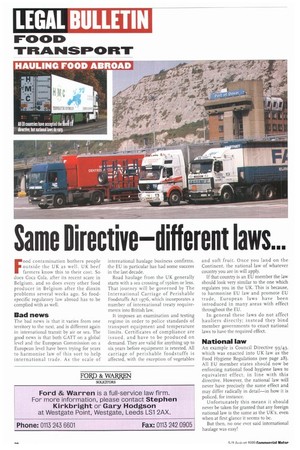Same Directive different laws...
Page 32

If you've noticed an error in this article please click here to report it so we can fix it.
Food contamination bothers people outside the UK as well. UK beef farmers know this to their cost. So does Coca Cola, after its recent scare in Belgium, and so does every other food producer in Belgium after the dioxin problems several weeks ago. So foodspecific regulatory law abroad has to be complied with as well.
Bad news
The bad news is that it varies from one territory to the next, and is different again in international transit by air or sea. The good news is that both GATT on a global level and the European Commission on a European level have been trying for years to harmonise law of this sort to help international trade. As the scale of international haulage business confirms, the EU in particular has had some success in the last decade.
Road haulage from the UK generally starts with a sea crossing of 150km or less. That journey will be governed by The International Carriage of Perishable Foodstuffs Act 1976, which incorporates a number of international treaty requirements into British law.
It imposes an examination and testing regime in order to police standards of transport equipment and temperature limits. Certificates of compliance are issued, and have to be produced on demand. They are valid for anything up to six years before equipment is retested. All carriage of perishable foodstuffs is affected, with the exception of vegetables and soft fruit. Once you land on the Continent, the national law of whatever country you are in will apply.
If that country is an EU member the law should look very similar to the one which regulates you in the UK. This is because, to harmonise EU law and promote EU trade, European laws have been introduced in many areas with effect throughout the EU.
In general these laws do not affect hauliers directly; instead they bind member governments to enact national laws to have the required effect.
National law
An example is Council Directive 93/43, which was enacted into UK law as the Food Hygiene Regulations (see page 28). All EU member states should now be enforcing national food hygiene laws to equivalent effect, in line with this directive. However, the national law will never have precisely the same effect and may differ radically in detail—in how it is policed, for instance.
Unfortunately this means it should never be taken for granted that any foreign national law is the same as the UK's, even when at first glance it seems to be.
But then, no one ever said international haulage was easy!








































































































